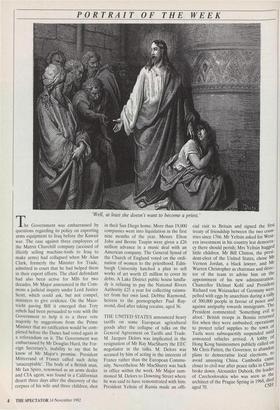PORTRAIT OF THE WEEK
`Well, least she doesn't want to become a priest.' at The Government was embarrassed by questions regarding its policy on exporting arms equipment to Iraq before the Kuwait war. The case against three employees of the Matrix Churchill company (accused of illicitly selling machine-tools to Iraq to make arms) had collapsed when Mr Alan Clark, formerly the Minister for Trade, admitted in court that he had helped them in their export efforts. The chief defendant had also been active for MI6 for two decades. Mr Major announced in the Com- mons a judicial inquiry under Lord Justice Scott, which could ask, but not compel, ministers to give evidence. On the Maas- tricht paving Bill it emerged that Tory rebels had been persuaded to vote with the Government to help it to a three vote majority by suggestions from the Prime Minister that no ratification would be com- pleted before the Danes had voted again in a referendum on it. The Government was embarrassed by Mr Douglas Hurd, the For- eign Secretary's, inability to say that he knew of Mr Major's promise. President Mitterrand of France called such delay `unacceptable'. The body of a British man, Mr Ian Spiro, renowned as an arms dealer and CIA agent, was found in a Californian desert three days after the discovery of the corpses of his wife and three children, shot in their San Diego home. More than 19,000 companies went into liquidation in the first nine months of the year. Messrs Elton John and Bernie Taupin were given a £26 million advance in a music deal with an American company. The General Synod of the Church of England voted on the ordi- nation of women to the priesthood. Edin- burgh University hatched a plan to sell works of art worth £5 million to cover its debts. A Lake District public house landla- dy is refusing to pay the National Rivers Authority £25 a year for collecting rainwa- ter from her own land. Debbie Raymond, heiress to the pornographer Paul Ray- mond, died after taking cocaine, aged 36.
THE UNITED STATES announced heavy tariffs on some European agricultural goods after the collapse of talks on the General Agreement on Tariffs and Trade. M. Jacques Delors was implicated in the resignation of Mr Ray MacSharry the EEC negotiator in the talks. M. Delors was accused by him of acting in the interests of France rather than the European Commu- nity. Nevertheless Mr MacSharry was back in office within the week. Mr Major sum- moned M. Delors to Downing Street where he was said to have remonstrated with him. President Yeltsin of Russia made an offi-
cial visit to Britain and signed the first treaty of friendship between the two coun- tries since 1766. Mr Yeltsin asked for West- ern investment in his country lest democra- cy there should perish; Mrs Yeltsin hugged little children. Mr Bill Clinton, the presi- dent-elect of the United States, chose Mr Vernon Jordan, a black lawyer, and Mr Warren Christopher as chairman and direc- tor of the team to advise him on the appointment of his new administration. Chancellor Helmut Kohl and President Richard von Weizsacker of Germany were pelted with eggs by anarchists during a rallY of 300,000 people in favour of peace and against antipathy towards immigrants. The i President commented: 'Something evil s afoot.' British troops in Bosnia returned fire when they were ambushed; operations to protect relief supplies to the town of Tuzla were subsequently suspended until armoured vehicles arrived. A lobby of Hong Kong businessmen publicly called On Mr Chris Patten, the Governor, to abandon plans to democratise local elections, to avoid annoying China. Cambodia cant e closer to civil war after peace talks in China broke down. Alexander Dubcek, the leader of Czechoslovakia who was seen as the architect of the Prague Spring in 1968, died


































































 Previous page
Previous page